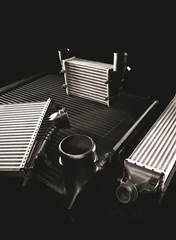Cooling

Nissen IntercoolersMore and more cars are being fitted with turbo-charged systems and intercoolers and most turbo-charged diesel and petrol engines in circulation today are already equipped with an intercooler. Intercooler Function Applying an intercooler in a turbo-charged system significantly improves the combustion process, and the outcome is increased engine power. Intercoolers reduce the temperature of the hot air compressed by the turbocharger, before it gets to the engine combustion chamber. This has a distinctive impact on the charge effect as the cooled air has a much higher density in terms of more air molecules per cubic centimetre. The results, a marked increase of air intake and a much improved engine output. The use of intercoolers in turbo-charged engines provide a number of benefits: • Increased engine power and efficiency • Lower fuel consumption - leading to better fuel economy • Lower engine emission values - meaning less pollution • Lower thermal stress on the engine and its components A damaged or malfunctioning intercooler can lead to serious damage of the turbocharger, engine or the exhaust filters. (DPF/FAP for diesel engines and catalysts for petrol engines.) Symptoms of a defective or leaking intercooler: • Noticeable drop engine power – caused by improper pressure in the turbo-charge system and improper ratio of oxygen in the fuel/air mixture • Increased fuel consumption – loss of oxygen causes an excessive intake of fuel to the mixture for the combustion process • Unnatural smoke from the exhaust system – triggered by a surplus of fuel that cannot be combusted and is consequently emitted from the exhaust system Causes of intercooler failure and the consequences: • Frontal accidents and stones/particles thrown from the road can cause physical, external damage which lead to leaks • Intercooler tubes that are clogged by oil, particles or damaged turbo parts reducing the internal air flow cause turbocharger failure • Improper sealing of the turbo unit causes clogging and the oil blown into the intercooler quickly damages the rubber gaskets, leading to leakages between the core and tanks or even ‘blown tanks’ • Soiled surface of the intercooler reduces the air flow and thus the cooling performance of the unit The intercooler should always be replaced when installing a new turbocharger. In the event of turbo failure, oil from the charger, as well as swarf from its damaged parts, can be sent through the entire system and may clog the intercooler channels. When a new turbocharger has been installed, the system will operate with high pressure, and both the oil and the particles collected in the intercooler risk being instantly blown to the combustion chamber, which may damage the engine. For this reason, remember that an intercooler should always be replaced after either turbocharger failure or when installing a new turbo unit. Before installing a new part, all of the system components must be thoroughly examined to ensure that they are not blocked by oil or swarf residues. |
Related Articles Related Downloads |